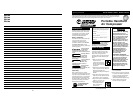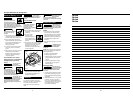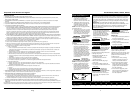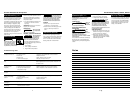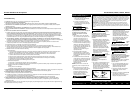
23
Do not locate the
compressor air inlet
near steam, paint spray, sandblast
areas or any other source of
contamination. This debris will damage
the motor.
This product is for
use on a nominal
120 volt circuit. Make sure that product
is connected to an outlet having same
configuration as plug.
WIRING
1. Local electrical wiring codes differ
from area to area. Source wiring,
plug and protector must be rated for
at least the amperage and voltage
indicated on motor nameplate, and
meet all electrical codes for this
minimum.
2. Use a slow blow fuse type T or a circuit
breaker.
Overheating, short
circuiting and fire
damage will result from inadequate
wiring, etc.
NOTE: This compressor can be operated
on a 115 volt, 15 amp circuit under the
following conditions:
a. Circuit is not heavily loaded.
b.Voltage supply is normal.
c. Extension cords are of the minimum
gauge specified in this instruction
manual.
d.Circuit is equipped with a 15 amp
circuit breaker or a 15 amp slow
blow fuse type T.
EXTENSION CORDS
To avoid loss of
power and possible
overheating, use additional air hose
instead of extension cords to reach
work area.
1. Use only a 3-wire extension cord that
has a 3-blade grounding plug, and a
3-slot receptacle that will accept plug
on product.
2. Make sure extension cord is in good
condition, and heavy enough to
carry current product will draw. An
undersized cord will cause a drop in
line voltage resulting in loss of
power and overheating.
NOTICE
!
CAUTION
!
CAUTION
!
CAUTION
2
Portable Handheld Air Compressor
Motors, electrical
equipment and controls
can cause electrical arcs
that will ignite a flammable gas or
vapor. Never operate or repair in or
near a flammable gas or vapor. Never
store flammable liquids or gases in the
vicinity of the compressor.
Compressor parts may be
hot even if the unit is
stopped.
9. Keep fingers away from a running
compressor; fast moving and hot
parts will cause injury and/or burns.
10.If the equipment should start to
abnormally vibrate, switch unit OFF
(O) and check immediately for the
cause. Vibration is generally a
warning of trouble.
11.To reduce fire hazard, keep motor
free of oil, solvent, or excessive
grease.
12.Fast moving air will stir up dust and
debris which may be harmful.
Release air slowly when draining
moisture or depressurizing the
compressor system.
Any misuse of unit could
cause property or equipment
damage and/or personal
injury.
Do not leave the
compressor
unattended while the unit is running.
Never exceed the
recommended pressure for
any inflatable object. Do
not over inflate objects.
Over inflation could cause property
damage and/or personal injury.
Always put the car
in park; set the
emergency brake; and block the wheels
(to stop them from moving) before
using the compressor or property
damage and/or personal injury could
occur.
!
WARNING
!
WARNING
!
WARNING
!
CAUTION
!
WARNING
Always use a sep-
arate pressure
gauge to check the actual pressure in
tires and in low pressure inflatable
objects.
SPRAYING PRECAUTIONS
Do not spray flammable
materials in vicinity of
open flame or near
ignition sources including the
compressor unit.
13.Do not smoke when spraying paint,
insecticides, or other flammable
substances.
14.Use a face mask/
respirator when
spraying and spray in a
well ventilated area to
prevent health and fire
hazards.
15.Do not direct paint or other sprayed
material at the compressor. Locate
compressor as far away from the
spraying area as possible to
minimize overspray accumulation
on the compressor.
16.When spraying or cleaning with
solvents or toxic chemicals, follow
the instructions provided by the
chemical manufacturer.
It is extremely important to use the
compressor in a clean, well ventilated
area where the surrounding air
temperature will not be more than
100°F.
!
WARNING
!
CAUTION
General Safety (Cont.)
Figure 1
Electrical Data
Location
www.chpower.com
Pressure
Regulator
Pressure
Gauge
Air Outlet
On/Off
Switch
Handle
Notes
Notes
Notas
Notas



